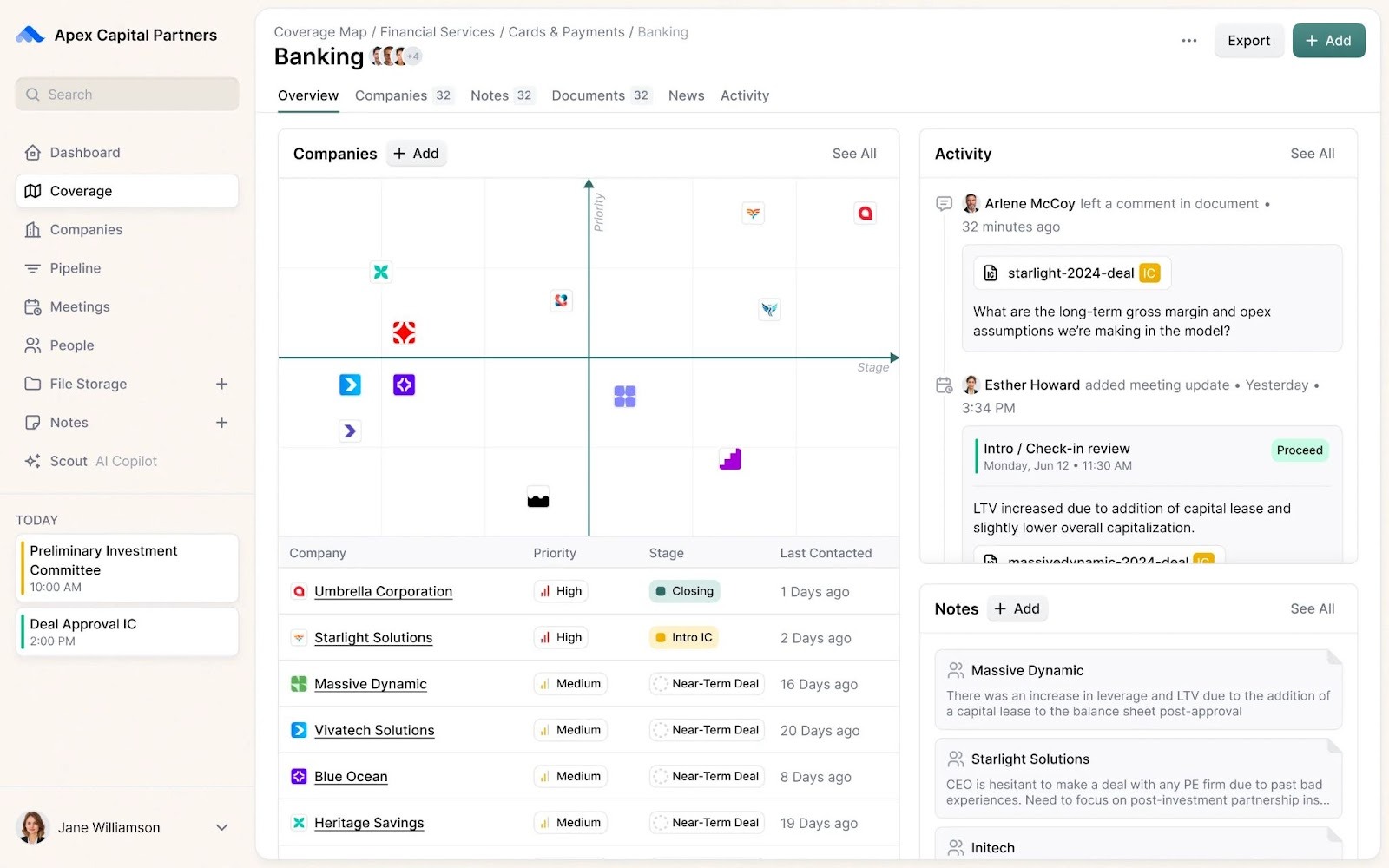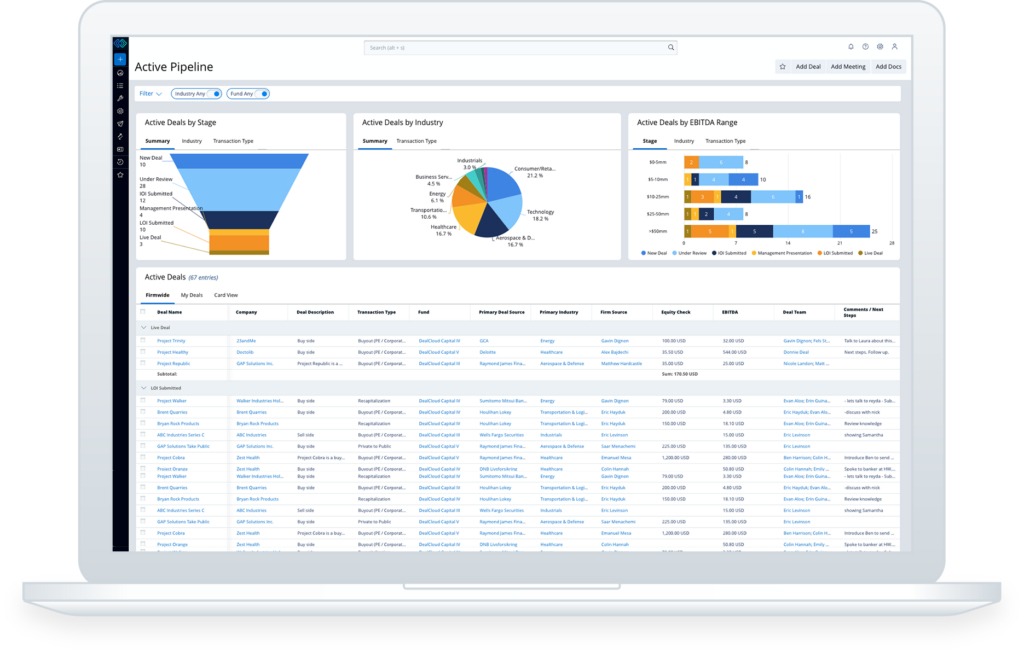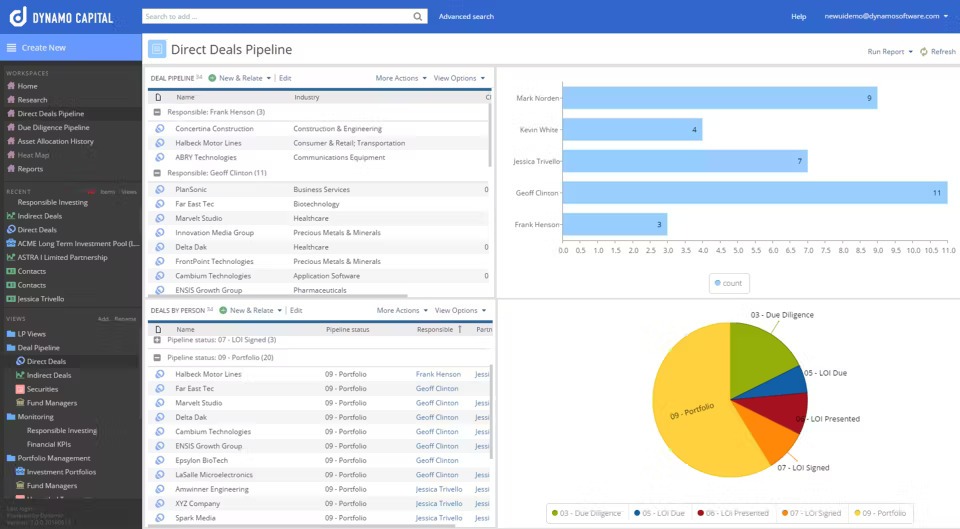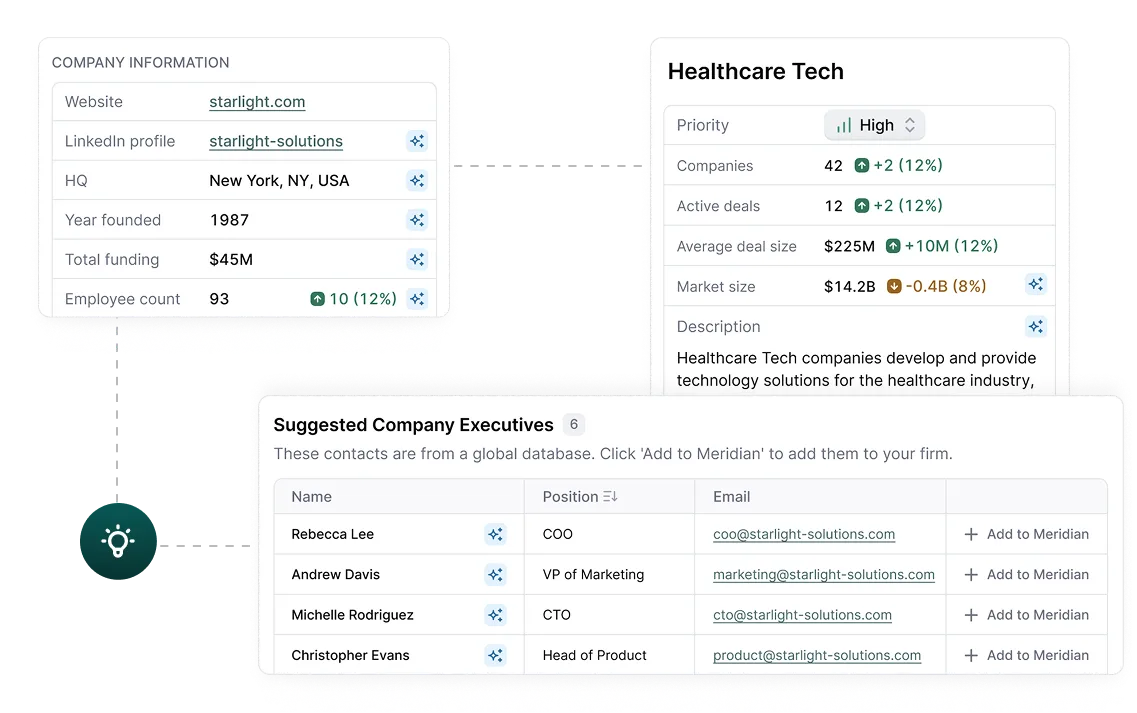Meridian raises $7M seed round led by 645 Ventures.
Read More
This in-depth comparison looks at features, use cases, pricing, and more of top Affinity competitors to help you make the best choice for your firm.

Deal teams are drowning in longer sales cycles and increasingly crowded markets. A purpose-built CRM can be a firm’s most powerful asset to stay competitive.
But a tool that only tracks introductions leaves blind spots. That’s why many PE firms look beyond Affinity for tools that help them benchmark opportunities and keep multi-year pipelines on track.
This article explores four Affinity CRM alternatives that improve workflows, surface insights, and give your firm the edge it needs to win the best deals.
Our top picks for the best Affinity alternatives:
You can think of Affinity as a polished address book with relationship scores attached. It’s useful for tracking who you know, but in PE, winning deals also requires spotting high-quality opportunities.
That’s where Affinity shows its limits. While it can surface emerging companies, it struggles to adapt to the complex workflows PE teams rely on. Portfolio monitoring and nuanced deal stages often require manual workarounds.
Pipeline management feels just as rigid with Affinity, and complex IC workflows don’t fit neatly into the platform’s structure.
Affinity auto-captures emails and meetings, but these interactions often remain at the individual contact or company level, rather than integrating seamlessly into multi-entity deal structures. Teams end up exporting to spreadsheets, stitching together reports, and doing the manual work that your CRM should handle automatically.
If Affinity can’t keep pace with your deal teams, it’s time to explore platforms built to handle sourcing, pipeline management, and long-term deal tracking. Below, we break down the top Affinity CRM alternatives for PE firms, highlighting how each platform helps you source better deals and manage multi-year pipelines.

Focus Area: Complete AI-powered CRM for PE
Meridian’s AI-native CRM is designed specifically for private equity teams by experts with experience at firms like Blackstone and Thoma Bravo. It turns relationships and deal data into an intelligence-driven system for sourcing and execution.
Instead of relying on manual data entry, Meridian automatically captures emails, meetings, and documents, ensuring complete and accurate records across long deal cycles. This means cleaner data and less time wasted on grunt work.
Built-in enrichment is another key differentiator. With a large number of company and executive profiles integrated into one platform, deal teams always work from current, verified information, which eliminates the need to toggle between systems.
The software also goes beyond deal tracking with Scout AI, an intelligence engine, which maps markets, highlights opportunities aligned with your investment thesis, and benchmarks new deals against historical activity to give teams actionable insights at the ideal moment.
Adoption is fast and frictionless, and a native Outlook integration syncs communication and information automatically.
Affinity does relationship tracking with its sourcing feature, but Meridian takes it further. Rather than stopping at pre-screened lists, Meridian’s Scout AI benchmarks opportunities against your deal history and highlights the sectors and companies with the strongest return potential.
While Affinity relies on activity capture to keep records updated, Meridian enriches contacts and companies with external data sources. This means cleaner profiles and stronger insights without extra manual work.
From data enrichment and IC workflow automation to thematic sourcing and deal flow management, Meridian handles all your firm’s most important processes.


Focus Area: Deal flow
4Degrees is a relationship intelligence platform designed with private equity in mind. The system automates some data entry, tracks interactions, and enriches contacts so investors spend less time updating records and more time moving deals forward.
One of its main features, the relationship strength scoring algorithm, highlights which connections are most valuable for warm introductions to help firms prioritize outreach that’s more likely to convert. Customizable pipelines are another strength, as they give your team the flexibility to customize pipeline stages to match your sourcing, due diligence, and portfolio processes.
But according to G2 users, the platform sometimes leans on manual tagging, which can create bottlenecks during busy sales cycles. For firms expecting a fully automated system, 4Degrees may still feel like a work in progress.
Affinity is strong at basic relationship tracking, but 4Degrees adds layers of intelligence that better support private equity workflows. Its relationship scoring highlights the most effective paths for introductions, while data enrichment keeps deal information current.

Focus Area: CRM for financial services
DealCloud pulls relationship intelligence, pipeline management, and third-party data integrations into one place, which gives your firm a central hub for sourcing and tracking opportunities. Features like automated contact creation, which include parsing email signatures and syncing with data providers, help keep records accurate without excessive manual effort.
Its relationship scoring and mapping capabilities are another highlight, which surface connections that can give your firm an edge in spotting stakeholders or securing introductions. Pipelines are also highly customizable, so your teams can align stages and workflows with their unique deal processes.
The downside is the platform’s complexity. It often comes with steep setup requirements and ongoing configuration needs, and firms may find themselves reliant on consultants to get the most out of the platform, which can slow time-to-value and drive up costs.
For teams without the bandwidth to manage continuous customization, DealCloud may feel more like an enterprise project than a straightforward CRM.
DealCloud is built around the full private equity workflow. While Affinity combines relationship tracking with sourcing and activity capture, DealCloud goes further with highly customizable pipelines and granular reporting, which turn raw data into actionable insights and ensure teams can manage complex pipelines with clarity and control.
Its relationship intelligence scores and maps key contacts, and the flexibility of its pipeline tools makes it easier to manage multi-year cycles and complex investment committee processes.
Learn how DealCloud compares to other competitors in our DealCloud alternatives article, or see a side-by-side comparison of Meridian vs. DealCloud.

Focus Area: End-to-end asset management platform
Dynamo is more of a full-service investment management platform than a pure CRM. It covers the full PE lifecycle, including deal scoring, portfolio monitoring, investor relations, and even fund accounting.
A dedicated investor portal helps firms manage relationships and improve transparency with LPs. Features like fundraising pipelines, mass-mailing capabilities, eSignature support, and Power BI integration help centralize critical workflows and add analytical depth.
Firms looking for a single system to cover both front and back office may find Dynamo’s all-in-one approach appealing.
That said, Dynamo’s wide scope means the platform can feel heavy and complex, especially for teams that primarily want a lean CRM for sourcing and pipeline management. Training and onboarding can be time-consuming, and you may end up paying for unused modules.
Dynamo provides a more comprehensive platform for private equity operations compared to Affinity. Its customizable deal pipelines, investor relations tools, and portfolio monitoring dashboards give teams the ability to manage sourcing, engagement, LP relationships, and performance in one place.
Not all CRMs are built for private equity, and choosing the wrong one can slow down deal teams and cause more issues than it solves. Consider these factors when researching Affinity alternatives to ensure the system you choose reduces pressure on your team instead of creating more:
Meridian was built from the ground up for private equity, not adapted from a generic CRM. Its AI-native architecture drives intelligent workflows, while real-time collaboration and flexible pipeline management ensure teams stay aligned on current and potential deals.
This approach helps PE firms source better opportunities and track relationships across long, multi-year sales cycles. Plus, the tool enables you to map entire markets thematically to uncover high-potential investments and avoid missing critical opportunities in competitive sectors.
Meridian helps your team source and track high-potential deals faster than your competitors, making it a clear choice among Affinity CRM alternatives for PE firms that want to work smarter, not harder.
Discover how Meridian can streamline deal sourcing and enhance your decision-making

Meridian was built by and for PE professionals, providing tools that keep your firm strategic, efficient, and ahead of the game.

Table of Contents


Discover why the most valuable private equity due diligence insights come from conversations, not spreadsheets, and how to build systematic conversation intelligence.

